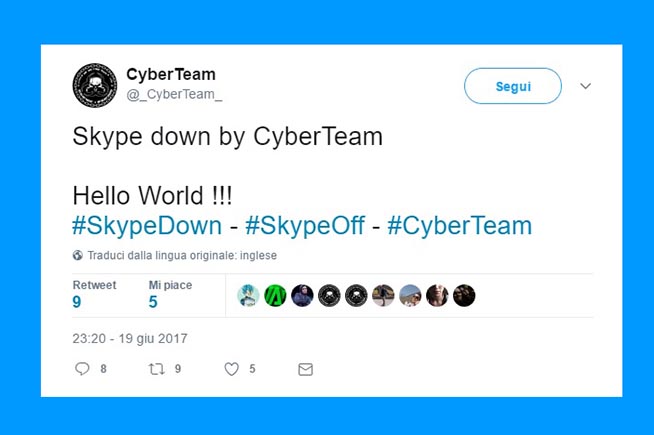The malfunction of the service is caused by a DDoS attack by the Portuguese group CyberTeam, which announced it on Twitter. Skype is down across Europe
If you have arrived at work and Skype does not work, the fault is not your computer, but the hacker group CyberTeam that in the evening of Monday, June 19 sent Skype down. A successful attack that has brought millions of people across Europe to their knees.
The first malfunctions were reported by users between the night of June 19 and June 20, shortly after the announcement of the successful hack by CyberTeam hackers on their Twitter account. Since then, most European users have been unable to log in to their profiles and communicate with their friends. The reasons that pushed the hackers to target the application and send Skype down are not known, but the hackers have announced that in the coming weeks other large companies will be targeted.
For the moment the information regarding the hacker attack on Skype is really small, but the cause could be a DDoS attack. On their Twitter profile, the CyberTeam guys define themselves as experts in DDoS attacks and this would explain the reason for such a large problem. From the reports coming through the Alert Service, Skype is down in most of Europe, mainly in the areas around the big cities.
Skype down, it's the fault of a DDoS attack
As mentioned before, it's very likely that Skype's servers have been hit by a DDoS attack, a technique that in the last period is very much used by hackers especially for the damage it inflicts on the chosen target.
Those who are not familiar with the IT world, most probably don't know what a DDoS attack is. It is a type of hacker attack that aims to knock out an Internet network by overloading it with access requests. Basically, hackers send fake requests to the servers of a program (as in the case of Skype) or a website (as happened to Twitter last year) in order to send them into tilt and make the service inaccessible.
To carry out a DDoS attack, however, it is necessary that the requests sent to the servers are really many. That's why hackers use botnets, which are networks of computers and devices infected with malware that hackers can control remotely. The owners of the devices are unaware that their computer is being operated by a hacker and contributing to a DDoS attack. The attacker is able to control every device in the botnet from a central point and simultaneously carry out a coordinated criminal action (a DDoS attack).
2017, a black year for European companies
Skype down is just the latest of many attacks European companies have had to endure in these early months of 2017. Between high-profile attacks like WannaCry and small viruses received via email on a daily basis, it is becoming increasingly difficult for European companies to defend themselves. A inizio anno Kevin Mandia e Peter J. Beshar, due esperti di sicurezza informatica avevano lanciato l’allarme: nel 2017 gli attacchi informatici conquisteranno le prime pagine dei giornali ed è esattamente quello che è successo con WannaCry prima e con Skype down ora.
Il prossimo obiettivo è Steam
 Fonte foto: Redazione
Fonte foto: Redazione
Il messaggio con il quale il CyberTeam rivendica l’attacco a Skype
Nell’annunciare su Twitter l’hackeraggio di Skype, il gruppo CyberTeam ha anche preannunciato il prossimo obiettivo: Steam, la famosa piattaforma dove acquistare videogame. Vedremo se gli hacker manterranno fede alla loro parola o se si tratta solamente di una boutade.
